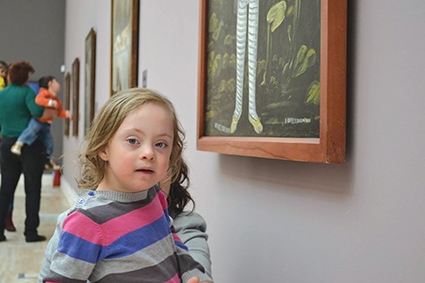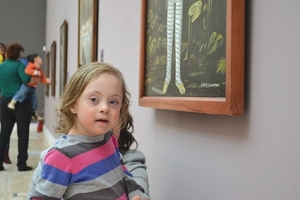Open Doors and Inclusive Education at the Georgian National Museum
The doors of the Georgian National Museum are open to all. In particular, it allows people with disabilities to not only visit the Museum, but to take part in a special educational program. Pilot project ‘Inclusive Education at the Museum’ is helping around 250-300 Georgian children with disabilities to develop their skills, learn and get inspired at the Museum.
The Educational Center of the Georgian National Museum was founded to create a unique platform for children – giving them the chance to learn something new and get acquainted with art on site. The Educational Center has offered excursions, lectures, thematic courses, field trips and summer camps. Recently, the Museum began to conduct lessons in German from the Goethe Institut. Employees of the Institut claim that this project has become so popular that they are planning to launch the same courses in English and French by the British Council and the French Institute respectively.
Museum staff recently decided to create a similar platform of education for people with disabilities. General Director of the Georgian National Museum, David Lordkipanidze, said that for a long time, the museum general has been separated from the masses. “It must be understood that our history and these unique relics, which are stored in our museums, are the real wealth of the country. There are no reasons to hope or wait for oil or gas to suddenly flow out of our ground. We need to cherish what we have and make it accessible to everyone. After all, the Museum is a unique place of learning and aesthetic pleasure,” said Lordkipanidze.
Since its launch, the Museum has been implementing changes and now it has all the technical and intellectual resources necessary to host anyone.
The project ‘Inclusive Education at the Museum’ will last nine months and include three stages. At the first stage, the Museum staff, psychologists, experts, social workers, non-governmental organizations like “Children of Sun”, Union “Our Children”, “Child, Family, Society”, “Anika” and Rehabilitation and Social Adaptation Center “Aisi” will develop strategies and methods of working with children with disabilities. It is also expected to cooperate with the ministries of Education, Culture, and Health of Georgia.
At the second stage, approximately 250-300 children with disabilities will have a chance to visit expositions at the National Gallery, and participate in different activities and games throughout May and June. After this, at the third stage, a petition will be elaborated which will describe the importance of museums and galleries in the process of developing inclusive education programs and the ability to implement the project on a permanent basis.
“This is not a pioneering project. We have carried out events for people with disabilities in the past,” said Lordkipanidze, referring to the exhibition related to problems that people with disabilities face every day and the exhibition for World Down Syndrome Day held at the Museum. “However, the problem is that it should not be a one-day event. Therefore, after this pilot program, when we thoroughly understand all the nuances, we are going to make it permanent and not only for children but for all ages,” he added.
Project coordinator Anna Zhvania believes that the project should be successfully implemented in Georgia. She points to the international practice. “There is well-built infrastructure for people with disabilities in some Polish museums where they have audio guides, Braille and an elevator for easy movement. The Louvre has a separate tactile gallery with copies of famous sculptures and everyone can study and touch them. The same practice can be seen in many other countries, for example, in the US and Russia,” she said.
In the framework of the ‘Inclusive Education at the Museum’ program, all museum curators and staff will be trained, as special skills are required to work with people with disabilities. Volunteers have already expressed great interest in the project. Since the project is at its first stage, the Museum’s representatives encourage all interested people to join in and contact the Museum.
Eka Karsaulidze












